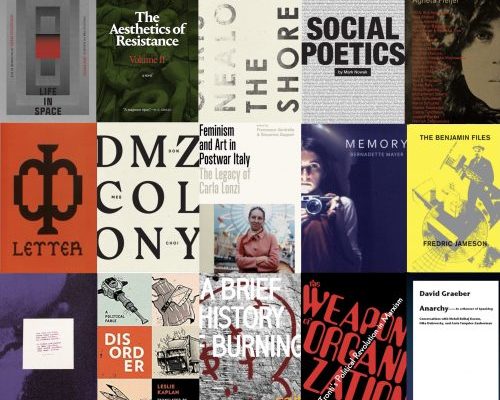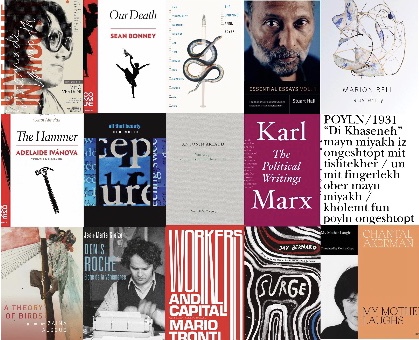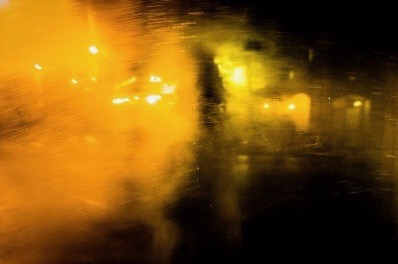Galina Rymbu | Life in Space (Translated by Joan Brooks) To be political, poetry does not have to turn into advertising, advocate for parties or platforms. Poetry becomes political when it represents the world as having a nature that is not “natural,” but rather negotiated, an Indra’s net that is political, social, and economic; made up of contingencies, and having to do with power—mainly of people over people—which is buttressed by ideology first and coercion second. A poetry that represents the world as political is political. It is also secular. A poetry that represents the world as immutable is…
Tag: Mario Tronti
Mario Tronti | “In art as in politics there is nothing other than struggle”
Can you really be outside? This is the question I asked Mario the last time we talked (Francesco Matarrese | Greenberg and Tronti: Being Really Outside?). Today, the eighth of January, his important, extraordinary answer arrived. Now it is here, naturally, in the written struggle, in this paper. In art as in politics there is nothing other than struggle Can you really be outside? This is the question. I answer: yes. I am. I feel I am. For sensibility, even before for reason. This world, as it is, as it is historically organized and dominated, does not…
Mario Tronti | I am defeated
Under the soles of his shoes, you can still recognise the dirt of history. “This is all that remains. A mix of straw and shit by which we delude ourselves into erecting cathedrals to the worker’s dream.“ Here’s a man, I say to myself, imbued with a consistency that bursts through in a total melancholy. It’s Mario Tronti, the most celebrated of the theorists of Operaismo. He has only recently finished writing a book on this subject: the origins of his thought, how it has changed and what it is today. I don’t know who will publish it (I…
Mario Tronti | Our Operaismo
While most political forms and traditions of the European left cross-pollinated freely across national boundaries, the Italian operaismo of the 1960s was largely a sui generis experience in its time. Credited with a significant intellectual impact at home—transforming Italian sociology, through its project of worker inquiries, and yielding a heady if evanescent crop of theoretical journals: Quaderni rossi, Classe operaia, Angelus Novus, Contropiano—it had less immediate reverberation abroad than the larger current around Il Manifesto, whose cultural breadth and political consistency was of a different order. A condition for operaismo’s existence was the dramatic industrial expansion of the 1950s, within a culture already deeply coloured by two mass…
Alberto Toscano | Mayakovsky at Mirafiori: Operaismo and the Negation of Poetry
Though many of the watchwords and guiding axioms of Italian operaismo and its successors have percolated into critical discourse on aesthetic production, and multiple analyses of its intersections with visual art and architecture in the 1960 and 1970s have been advanced, little has been made of its specific approach to the question of poetics. This chapter aims partially to correct this tendency by exploring the arguments about the unhappy marriage between avant-garde poetry and communist politics sketched out in some interventions by the key literary critic and historian in the collective of militant intellectuals that made up ‘classic’ operaismo,…
Best Books of 2019
Miyó Vestrini | Grenade in Mouth Those who write are not even of a race. Nor a caste. Nor a class. Nor are they one. They ruin the point of living, like women in a world of science. Behind thick lenses, the court is never dull. They have all privileges: from philosophy up to anger, passing through conjugal relations, and the length of the paragraphs. Between the rights of man it is figured that the writer should write largely for himself first, then for the others, with a purpose well or poorly defined: to flood the window displays,…
riots and/or poetics [8/2019]
The exact link is uncertain. But we know the Nazis loved / America; Hitler yearned to paint a twin, // a green room where the dead are everywhere. / Asked Abraham before the flame, to the obedient tribe // What are these statues you cling to? // Why calico, why Spanish moss, why the crickets scream. / Confederates raise the undead everywhere. // In a segregated graveyard, no stone reads / private or public; the local jail is everywhere. // Before another body is buried, a window is broken. / A window was broken. The window is broken. // I look everywhere for Fanon’s knife, waiting for…
Tiqqun | This Is Not a Program
“’77 wasn’t like ’68. ’68 was anti-establishment, ’77 was radically alternative. This is why the ‘official’ version portrays ’68 as good and ’77 as bad; in fact, ’68 was co-opted whereas ’77 was annihilated. This is why, unlike ’68, ’77 could never make for an easy object of celebration.”
— Nanni Balestrini, Primo Moroni, L’orda d’oro








